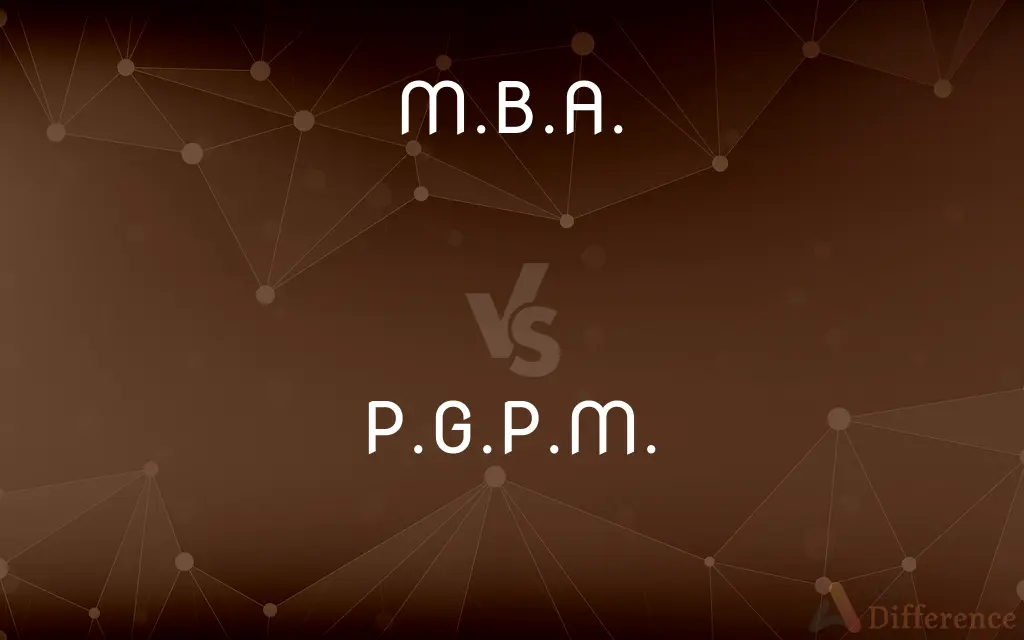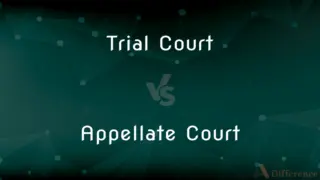M.B.A. vs. P.G.P.M. — What's the Difference?
Edited by Tayyaba Rehman — By Fiza Rafique — Published on November 21, 2023
M.B.A. stands for Master of Business Administration, a postgraduate degree in business management. P.G.P.M. is Post Graduate Program in Management, an advanced management course without the "degree" status.

Difference Between M.B.A. and P.G.P.M.
Table of Contents
ADVERTISEMENT
Key Differences
M.B.A. is a globally recognized postgraduate degree in business administration and management. On the other hand, P.G.P.M. is a postgraduate program focusing on management without the formal "degree" status.
The duration of an M.B.A. program typically extends over two years. In contrast, P.G.P.M. can vary in length, often lasting for one year.
M.B.A. programs are universally accredited by established bodies, ensuring a standard quality of education. P.G.P.M. might not always have such widespread accreditation, depending on the institution offering it.
Both M.B.A. and P.G.P.M. cover core management subjects. However, P.G.P.M. courses might be more industry-specific or niche compared to the broader approach of the M.B.A.
The M.B.A. degree is universally acknowledged and accepted by employers worldwide. P.G.P.M., being more regional, might not have the same global recognition as the M.B.A.
ADVERTISEMENT
Comparison Chart
Nature
Degree program.
Advanced management program.
Duration
Typically 2 years.
Can vary, often 1 year.
Accreditation
Universally accredited by established bodies.
Might lack widespread accreditation.
Curriculum Focus
Broad management subjects.
More industry-specific or niche.
Global Recognition
Universally recognized.
Might lack global recognition compared to M.B.A.
Compare with Definitions
M.B.A.
M.B.A. is a postgraduate degree in business and management.
After completing his M.B.A., John got a job at a top consulting firm.
P.G.P.M.
P.G.P.M. is a postgraduate program focused on specialized management studies.
Ravi took up P.G.P.M. to specialize in digital marketing.
M.B.A.
M.B.A. graduates are sought after for their strategic thinking and problem-solving abilities.
Companies often hire M.B.A. graduates for their analytical skills.
P.G.P.M.
P.G.P.M. provides practical knowledge without the formal "degree" tag.
Though not a degree, P.G.P.M. offers industry-relevant skills.
M.B.A.
M.B.A. is a globally recognized qualification for advanced business roles.
Many CEOs possess an M.B.A. credential.
P.G.P.M.
P.G.P.M. is usually offered by top business schools and is highly competitive.
The P.G.P.M. at the elite institute had a rigorous selection process.
M.B.A.
M.B.A. enhances skills in leadership, finance, and marketing.
Sarah pursued her M.B.A. to climb the corporate ladder.
P.G.P.M.
P.G.P.M. courses might be shorter and more intensive than traditional M.B.A. programs.
Priya opted for P.G.P.M. because she wanted a one-year intensive course.
M.B.A.
M.B.A. programs often include case studies, projects, and internships.
During his M.B.A., Mike worked on a live project with a renowned company.
P.G.P.M.
P.G.P.M. often caters to specific industry needs or niches.
The P.G.P.M. in healthcare management is gaining traction.
Common Curiosities
What is an M.B.A.?
M.B.A. stands for Master of Business Administration, a postgraduate degree in business management.
How long does it take to complete an M.B.A.?
An M.B.A. program typically lasts for two years.
What is P.G.P.M.?
P.G.P.M. stands for Post Graduate Program in Management, an advanced management course without the "degree" status.
Which has wider recognition, M.B.A. or P.G.P.M.?
M.B.A. generally has broader global recognition compared to P.G.P.M.
How long is a P.G.P.M. course?
P.G.P.M. can vary in duration, often lasting for one year.
Are M.B.A. programs more rigorous than P.G.P.M.?
Both can be rigorous, but it depends on the institution and curriculum.
Can I pursue P.G.P.M. after an M.B.A.?
Yes, if you wish to gain specialized knowledge in a particular area of management.
Is P.G.P.M. a degree like M.B.A.?
No, while M.B.A. is a degree, P.G.P.M. is a postgraduate program without the formal "degree" tag.
Which has better job prospects, M.B.A. or P.G.P.M.?
Both can offer good job prospects, but M.B.A. might have a broader global appeal.
Do both M.B.A. and P.G.P.M. cover the same subjects?
They might cover similar core management subjects, but P.G.P.M. can be more niche or industry-specific.
Is P.G.P.M. cheaper than M.B.A.?
Costs can vary based on the institution, location, and course specifics.
Which is more industry-oriented, M.B.A. or P.G.P.M.?
While both can be industry-relevant, P.G.P.M. often caters more to specific industry needs or niches.
Are M.B.A. programs always two years long?
While many are two years, there are also one-year executive M.B.A. programs available.
Which should I choose, M.B.A. or P.G.P.M.?
It depends on your career goals, the recognition you desire, and the time you wish to invest. Consider factors like curriculum, duration, recognition, and your career objectives.
Do all business schools offer P.G.P.M.?
No, not all business schools offer P.G.P.M.; it depends on the institution.
Share Your Discovery

Previous Comparison
Wide Feet vs. Narrow Feet
Next Comparison
Lose vs. LossAuthor Spotlight
Written by
Fiza RafiqueFiza Rafique is a skilled content writer at AskDifference.com, where she meticulously refines and enhances written pieces. Drawing from her vast editorial expertise, Fiza ensures clarity, accuracy, and precision in every article. Passionate about language, she continually seeks to elevate the quality of content for readers worldwide.
Edited by
Tayyaba RehmanTayyaba Rehman is a distinguished writer, currently serving as a primary contributor to askdifference.com. As a researcher in semantics and etymology, Tayyaba's passion for the complexity of languages and their distinctions has found a perfect home on the platform. Tayyaba delves into the intricacies of language, distinguishing between commonly confused words and phrases, thereby providing clarity for readers worldwide.
















































